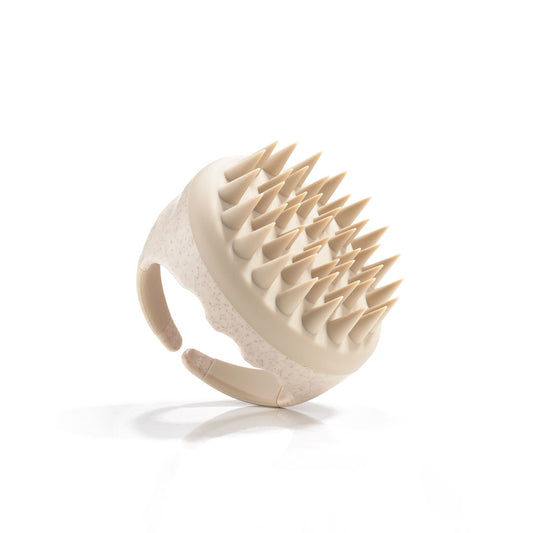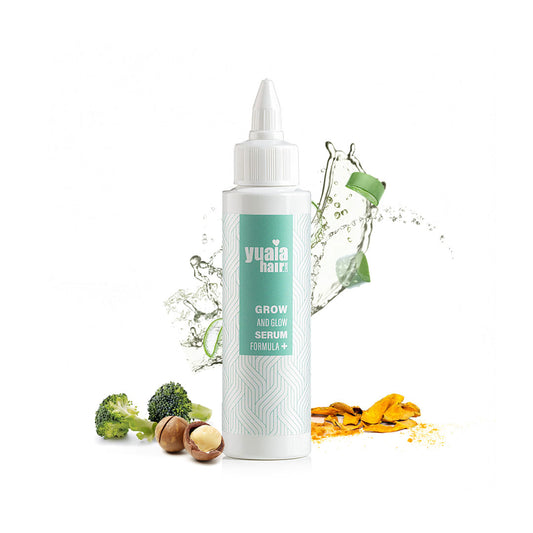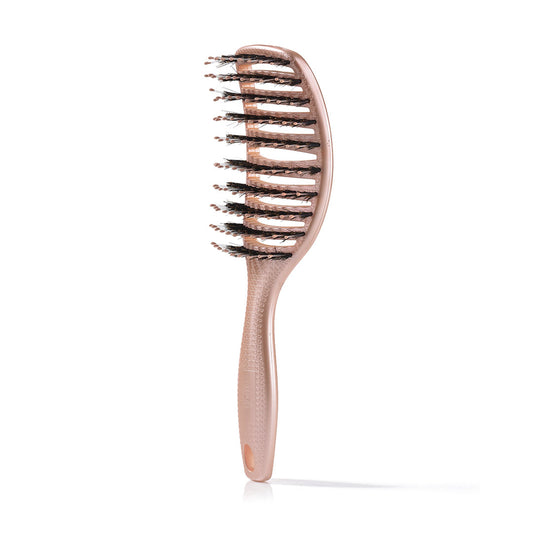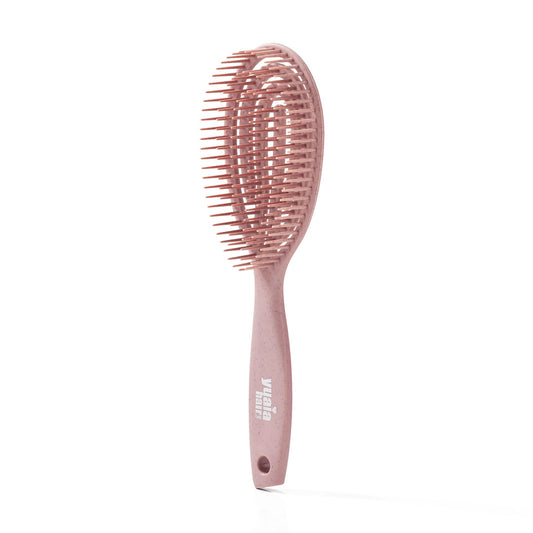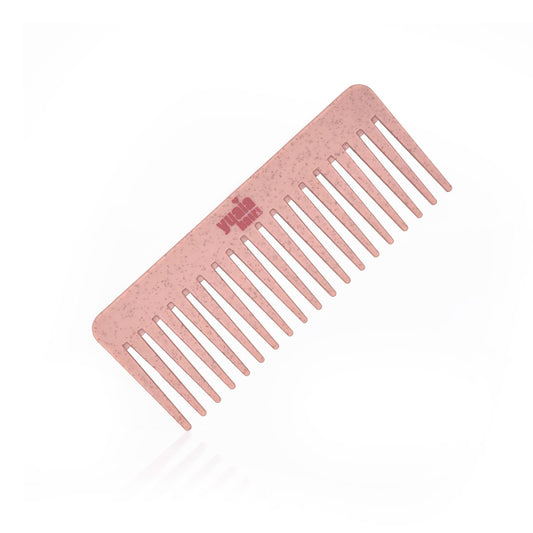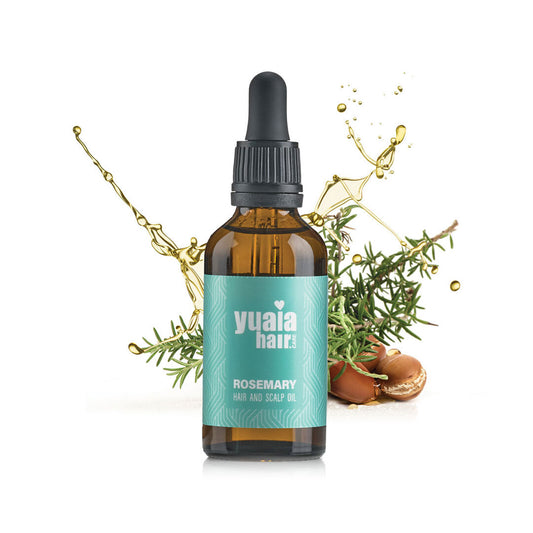
Brushing and scalp stimulation
One of the primary reasons people believe brushing stimulates hair growth is the idea that it increases blood circulation in the scalp. Theoretically, improved blood flow could supply hair follicles with more oxygen and nutrients, promoting healthy growth. However, there is no scientific evidence to prove that brushing alone can directly increase the rate of hair growth.
While brushing does stimulate the scalp to some extent, its impact is not significant enough to alter the natural hair growth cycle. Instead, scalp massages—particularly those performed with gentle pressure and essential oils—are considered more effective for promoting circulation and encouraging a healthy scalp environment. Additionally, certain hair tools, such as scalp massagers, have been developed specifically to stimulate blood flow and enhance nutrient delivery to the hair follicles, which may offer more benefits than traditional brushing.
Benefits of regular hair brushing
Although brushing does not directly stimulate hair growth, it plays an essential role in maintaining overall hair health. Incorporating regular, gentle brushing into your routine can help improve hair texture, manageability, and scalp condition.
Distributes natural oils: Brushing spreads the scalp’s natural sebum along the hair shaft, keeping hair hydrated and preventing dryness. This natural conditioning effect reduces the need for excess hair products.
Removes debris and buildup: It helps clear away dirt, dead skin cells, and product residue, keeping the scalp clean and promoting a healthier environment for hair.
Detangles hair: Regular brushing prevents knots and tangles, reducing the risk of breakage and split ends. Using a gentle technique minimizes stress on the hair shaft.
Enhances shine: Evenly distributing natural oils along the hair length gives hair a smoother, shinier appearance.
By brushing properly and using the right tools, you can maintain healthier, more manageable hair while preventing unnecessary damage.
Potential risks of over-brushing
While brushing offers many benefits, excessive brushing can lead to hair damage. Over-brushing weakens hair strands, making them more susceptible to breakage, scalp irritation, and even increased shedding.
Breakage: Too much brushing creates friction, causing split ends and weakened strands that break easily.
Scalp irritation: Brushing aggressively can lead to scalp sensitivity, inflammation, and, in extreme cases, hair loss.
Increased oil production: Over-brushing overstimulates the sebaceous glands, leading to greasier hair that requires more frequent washing.
Hair thinning: For those with fine or thinning hair, excessive brushing may accelerate shedding and further weaken delicate strands.
To prevent these issues, brush gently and only as needed to detangle and distribute natural oils. Opt for soft-bristle brushes or wide-tooth combs if you have fragile hair. Limiting brushing frequency and using proper techniques can help maintain hair health while minimizing damage.
Proper brushing techniques
To get the most out of hair brushing, follow these best practices:
Use the right brush: Choose a brush suited to your hair type. Boar bristle brushes work well for distributing natural oils, while wide-tooth combs are ideal for curly or textured hair.
Start from the ends: Begin brushing from the tips and work your way up to prevent unnecessary tugging and breakage.
Brush gently: Avoid excessive force when brushing to prevent damaging hair strands and irritating the scalp.
Avoid brushing wet hair: Wet hair is more prone to breakage, so use a wide-tooth comb if detangling is necessary after washing.
Limit brushing to when needed: Contrary to popular belief, brushing hair 100 times a day is not necessary and can do more harm than good. Instead, brush your hair only as needed to detangle and distribute oils.
Alternative methods to promote hair growth
Since brushing does not significantly impact hair growth, incorporating alternative methods into your routine can support healthier, stronger hair.
Scalp massage: Massaging the scalp with essential oils like rosemary or peppermint can boost circulation, delivering nutrients to the hair follicles and encouraging growth.
Balanced diet: A diet rich in biotin, omega-3 fatty acids, and protein helps maintain normal hair. Essential vitamins and minerals, such as iron and zinc, also play a role in maintaining healthy hair.
Minimize heat styling: Excessive heat weakens the hair shaft, leading to breakage and slower growth. Reducing heat exposure and using heat protectants can help maintain hair strength.
Use gentle hair care products: Sulfate-free shampoos and hydrating conditioners preserve the scalp’s natural balance, preventing irritation and dryness that can hinder growth.
By adopting these habits, you can create an optimal environment for hair growth and long-term hair health.
Try our Hair Growth Kit
Our Hair Growth Kit is made to promote hair growth and improve hair thickness. It includes the Grow & Glow Shampoo, Conditioner, and Hair Mask, all formulated to strengthen hair and reduce hair loss.
Key Benefits:
-
Grow & Glow Shampoo: Stimulates hair growth and thickens strands.
-
Grow & Glow Conditioner: Strengthens and enhances shine.
-
Grow & Glow Hair Mask: Provides deep nourishment and hydration.
With active ingredients like Capilia Longa and Amaranthus Caudatus Seed Extract, the kit helps reduce hair loss and increase hair density. Use consistently for healthier, fuller hair.
The role of brushing in a healthy hair care routine
While brushing your hair does not directly stimulate hair growth, it plays an important role in maintaining hair health. Regular brushing distributes natural oils, prevents tangles, and removes buildup, all of which contribute to healthier-looking hair.
However, excessive brushing can lead to breakage and irritation, so it’s essential to use the right techniques and tools. For those looking to promote hair growth, focusing on scalp massage, a balanced diet, and overall hair care will yield better results than relying on brushing alone. By implementing healthy hair care practices and avoiding common brushing mistakes, you can support stronger, healthier hair in the long run.
Frequently Asked Questions
Does brushing your hair make it grow faster?
No, there is no scientific evidence that brushing your hair directly makes it grow faster. While brushing can help distribute natural oils and improve scalp health, it does not alter the natural hair growth cycle or increase the rate of hair growth.
How often should you brush your hair?
You should brush your hair as needed to detangle and distribute natural oils. Over-brushing can cause breakage and scalp irritation, so it's best to use gentle techniques and avoid excessive brushing.
What is the best type of brush for healthy hair?
The best brush depends on your hair type. Boar bristle brushes are great for distributing oils on straight or wavy hair, while wide-tooth combs are ideal for curly or textured hair to prevent breakage and tangling.
Can over-brushing damage your hair?
Yes, over-brushing can lead to breakage, split ends, scalp irritation, and increased shedding. It's important to brush gently and only as needed to maintain healthy hair.
Are there better ways to promote hair growth than brushing?
Yes, methods such as regular scalp massages, maintaining a balanced diet, minimizing heat styling, and using gentle hair care products are more effective for promoting healthy hair growth than brushing alone.
 2-5 day delivery
2-5 day delivery
 25.000+ satisfied customers
25.000+ satisfied customers
 Satisfaction Guarantee
Satisfaction Guarantee



















